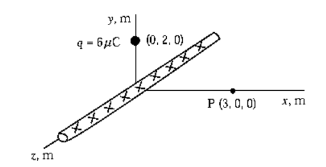Multiple Choice
Use the following to answer the problem:
-An infinite line charge of linear density = 0.30 µC/m lies along the z axis and a point charge q = 6.0 µC lies on the y axis at y = 2.0 m. The electric field at the point P on the x axis at x = 3.0 m is approximately
A) (4.2 kN/C) 
B) (4.2 kN/C)  + (0.64 kN/C)
+ (0.64 kN/C) 
C) (-0.96 kN/C) 
D) (2.8 kN/C)  + (0.64 kN/C)
+ (0.64 kN/C) 
E) (5.2 kN/C)  - (2.3 kN/C)
- (2.3 kN/C) 
Correct Answer:

Verified
Correct Answer:
Verified
Q3: A spherical shell of radius 9.0
Q10: An infinitely long cylindrical shell of
Q12: <img src="https://d2lvgg3v3hfg70.cloudfront.net/TB6081/.jpg" alt=" An
Q13: <img src="https://d2lvgg3v3hfg70.cloudfront.net/TB6081/.jpg" alt=" A
Q16: A large,flat conducting plate has a
Q19: A conducting circular disk has a uniform
Q20: An electric field is <img src="https://d2lvgg3v3hfg70.cloudfront.net/TB6081/.jpg" alt="An
Q21: <img src="https://d2lvgg3v3hfg70.cloudfront.net/TB6081/.jpg" alt=" A
Q23: Use the following figure to answer
Q43: A uniform circular ring has charge Q